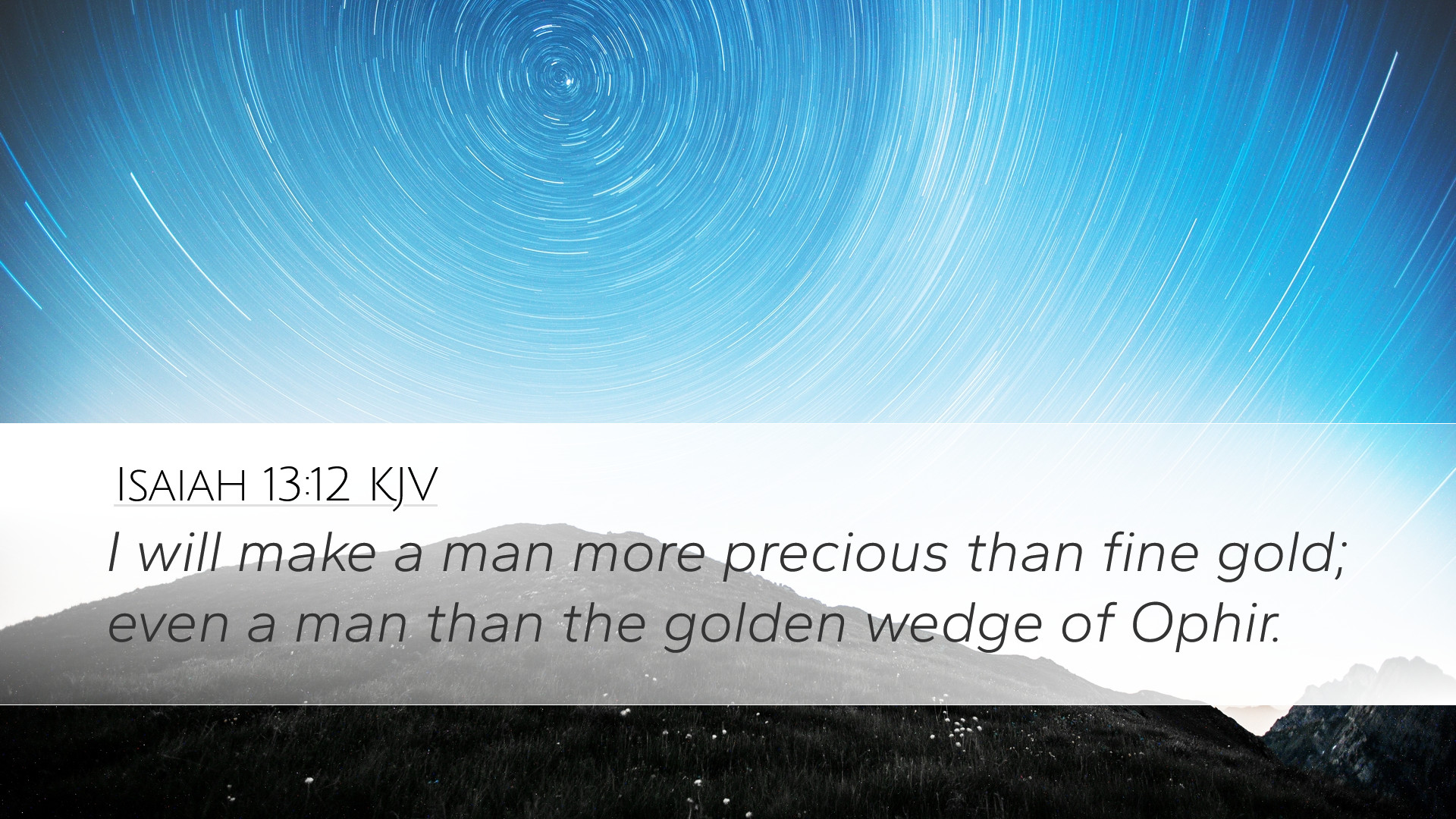Isaiah 13:12 - Commentary
Verse: "I will make a man more precious than fine gold; even a man than the golden wedge of Ophir."
Introduction
Isaiah 13:12 presents a prophetic declaration that illustrates the severe consequences of God's judgment against Babylon and, metaphorically, against those who oppose Him. The passage explores themes of worth, divine judgment, and the intrinsic value of humanity in the sight of God. Below, we delve into insights drawn from several esteemed public domain commentaries, offering a rich tapestry of understanding for pastors, students, theologians, and Bible scholars.
Exegesis of the Verse
In Isaiah 13, the prophet Isaiah delivers a message concerning the impending destruction of Babylon, a symbol of pride and opposition to God. Verse 12 specifically emphasizes the devaluation of humanity in times of divine judgment. The comparison of man to fine gold underscores a stark reversal of values—the precious becomes scarce due to catastrophic circumstances.
Matthew Henry's Commentary
Matthew Henry interprets this verse in light of the judgment upon Babylon, noting that the scene depicts a time of great desolation. He argues that in the context of the destruction, human life will become exceedingly rare and precious, suggesting a valued sanctity in every soul when surrounded by devastation. Henry emphasizes that the phrase "more precious than fine gold" indicates a time when human existence will be esteemed highly due to the scarcity induced by calamity and the mortal threat of warfare.
Albert Barnes' Commentary
Albert Barnes provides a thorough analysis of the verse, noting that the peoples' lives and their value will be re-evaluated amidst tribulation. He points out that the mention of "Ophir," known for its wealth, serves to amplify the message that what is typically understood as valuable (material wealth) will pale in comparison to the intrinsic worth of human life during calamity. Barnes posits that the day of destruction will lead to a recognition of humanity's fragility—a sobering realization that leads mankind to appreciate life in its purest form. In a deeper theological sense, he suggests that this rare beauty enhances the divine image in man that was tainted by sin but can shine through even amidst devastation.
Adam Clarke's Commentary
Adam Clarke provides an in-depth linguistic analysis, interpreting the term "man" as inclusively representing humanity. He discusses the notion that during times of profound loss and judgment, not only will individual lives become scarce, but the judgment will necessitate a reevaluation of societal values. Clarke underlines that this shift reflects God’s sovereignty, reminding readers that all earthly treasures, including gold, ultimately fade compared to the sanctity God places on human life. He sees an eschatological implication in the text, suggesting that this verse might point toward the eventual reconciliation and restoration during the Messianic age, where mankind’s intrinsic worth is finally realized and honored.
Theological Implications
The implications of Isaiah 13:12 extend beyond mere historical context—they beckon contemporary believers to reflect on their values and insights about life and mortality.
- Human Value: The declaration of man’s worth exceeding that of gold is a powerful reminder for believers to appreciate and honor life, particularly in cultures that often prioritize material wealth over spiritual integrity.
- Judgment and Grace: The prophecy serves as a cautionary tale of divine judgment but also highlights the grace that remains in recognizing the value of individuals. Pastors can glean from this that God values each life, even amidst sin and judgment.
- Hope in Despair: The notion that mankind can be restored can provide hope during desperate times, reinforcing that God's plans include redemption and restoration.
Application for Ministry
As pastors and leaders in faith communities, Isaiah 13:12 challenges one to preach and teach with an awareness of human fragility and value. In counseling settings, the reflection upon this verse can offer solace to those grappling with thoughts of insignificance or worthlessness, assuring them that in God’s eyes, even in judgment, their lives carry profound significance. Furthermore, this verse can function as a catalyst for mission work, prompting a focus on outreach efforts that honor and preserve human life, reflecting God’s own valuation of humanity.
Conclusion
Overall, Isaiah 13:12 stands as a striking reminder of the value God places on humanity. Through the insights gathered from the commentaries of Matthew Henry, Albert Barnes, and Adam Clarke, it becomes clear that amidst judgment and destruction, there is a firm reassurance of the worth of individuals—a theme that resonates powerfully in both historical context and modern application. This verse is a call to honor the sanctity of life, to recognize the divine image in every human, and to respond with grace and truth in the face of a world often bent on materialism and neglect.


